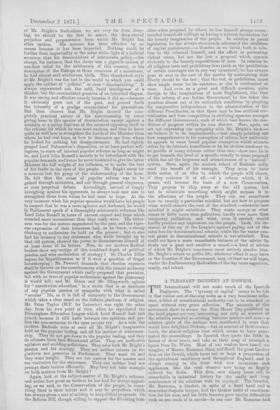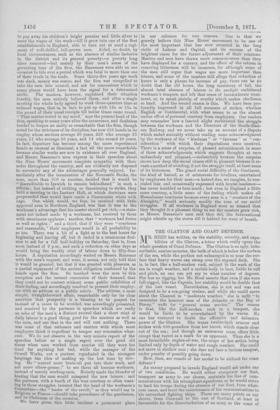A PLEASANT INCIDENT AT IPSWICH.
THE International will not make much of the Ipswicbr Engineers. The "tyranny of capital" seems to be felt. in that rather out-of-the-way town as a very beneficent influ- ence, a kind of constitutional authority not to be attacked or upset without very grave reflection. The accounts of the movement there to secure the Nine Hours' Day published in the local papers are very interesting, not only on acoount of the relation revealed as existing between masters and men—a. relation quite of the antique sort, manifested in ways that would have delighted Dickens,—but on account of their conlem- locale, the almost religious tone which seems to have pene- trated the proceedings. In Ipswich they quote the Bible in. favour of short hours, and take as their song of triumph a hymn from Dr. Watts. Most of our readers have heard, we imagine, of Messrs. Ransome, Sims, and Head, the great Quaker firm on the Orwell, which turns out so large a proportion of the agricultural machinery used throughout England, and is always coming to the front with new inventions an& appliances, like the road steamer now being so largely ordered for India. This firm, now ninety years old, is remarkable in industrial history for the amity and long- continuance of its relations with its emplope's. The founder, Mr. Ransome, a Quaker, in spite of a hard head and a- somewhat despotic temper, had the Quaker habit of considera- tion for his men, and his little foundry grew amidst difficulties such as one reads of in novels—in one case Mr. Ransome ha&
to pay away his children's bright pennies and little silver to meet the wages of the week—till it grew into one of the first establishments in England, able to turn out at need a regi- ment of well-drilled, full-grown men. Aided, no doubt, by local circumstances, such as the absence of similar factories in the district and its general poverty—a poverty long since removed—but mainly by their men's sense of the governing tone of the firm, the Ransomes were able on one occasion to tide over a period which was fatal to more than one of their rivals in the trade. Some thirty-five years ago work was slack, money was scarce, and the firm was compelled to take the men into council, and ask for concessions which in many places would have been the signal for a determined
strike, The masters, however, explained. their situation frankly, the men entirely believed them, and after a single meeting the whole body agreed to work three-quarters time at reduced wages, that is, in fact, to put up with 12s. or 13s. in the pound of their usual receipts till better times came round. "That matter rested in my mind," says the present head of the firm, speaking so many years after the occurrence, and doubtless tended to deepen an amity so remarkable that the firm, though noted for the strictness of its discipline, has now 456 hands in its employ whose services average 20 years, 328 who average 25 years, 51 who average 36 years, and 14 who exceed 46 years. In fact, departure has become among the more experienced hands as unusual as dismissal, a fact all the more remarkable because similar works are now in existence all over England, and Messrs. Ransome's men express in their speeches about the Nine Hours' movement complete sympathy with their order throughout the country, and are evidently not disposed to surrender any of the advantages generally enjoyed. Im- mediately after the termination of the Newcastle Strike, the men, more than 900 in number, decided that it would be discreditable to Ipswich to remain behindhand " in such a reform ; but instead of striking or threatening to strike, they held a meeting in the Lecture Hall, at which doctrines were .propounded that would have made a Communist white with rage. One, which would, we fear, be received with little approval even in Northern England, was that it was to the workman's advantage that his master should get rich,---a state- ment not indeed made by a workman, but received by them with unanimous applause ; another, that "workmen had duties as well as rights ;" and a third, that if they were "courteous and reasonable," their employers would in all probability be so too. There was a bit of a fight as to the best hours for beginning and leaving off, but it ended in a unanimous deci- sion to ask for a full half-holiday on Saturday, that is, from noon instead of 2 p.m., and such a reduction on other days as would bring the weekly stint of labour down to fifty-four .hours. A deputation accordingly waited on Messrs. Ransome
with the men's request, and were, it seems, not only told that it would be granted, but that it was granted with pleasure, as a partial repayment of the ancient obligation conferred by the hands upon the firm. So touched were the men by this reception and the instant concession of their demand, that they could not be content without some public exhibition of their feeling, and accordingly resolved to present their employ- ers with an address at a public soirsie. The address, a most simple, straightforward affair, remarkable only for its clear assertion that prosperity is a blessing to be prayed for instead of a snare to be avoided, was accordingly presented, and received by the partners in speeches which are really an echo of the men's, a distinct avowal that a short stint of daily labour is a good thing, good for the masters as well as the men, and one that in the end will cost nothing. There was none of that reticence and caution with which most employers think it expedient to temper any concession what- ever. We do not observe in the very minute report of the speeches before us a single regret over the good old times when men worked from sunrise till they were too tired for anything but bed, while the manager of the Orwell Works, not a partner, repudiated in the strongest language the idea of making up the lost time by driv- ing. He "wanted more brain-oil put into their work, and not more elbow-grease ;" to see them all become workmen, instead of merely working-men. Nobody made the blunder of hinting that the men would misspend the new leisure ; and the partners, with a touch of the true courtesy so often want- ing in these struggles, insisted that the head of the workmen's Committee—the "leader of the revolt," as they would say in Belgium or Prance—should take precedence of the gentlemen, and be Chairman of the occasion. We have given this little incident a prominent place in our columns for two reasons. One is that we gravely believe this Nine Hours' movement to be one of the most important that has ever occurred in the long strife of Labour and Capital, and its success of the brightest omen for the future adjustment of their relations. Masters and men have shown more common-sense than they have displayed for a century, and the effect of the reform in removing bitterness will be immense, for although some of the men still argue that wages are more important than leisure, and some of the masters still allege that reduction of hours is only a phrase for increase of pay, there can be no doubt that the old hours, the long monotony of toil, the almost total absence of leisure in the sunlight embittered workmen's tempers, and left that sense of inconsiderate treat- ment, or, to speak plainly, of cruelty which makes obedience so hard. And the second reason is this. We have been pro- foundly impressed in all full accounts of strikes, whether English or Continental, with what seems to us the almost undue effect of personal courtesy from employers. Our readers may remember how a fancied slight embittered the struggle between the workmen and the Directors of the South-East- ern Railway, and we never take up an account of a dispute which ended amicably without reading some acknowledgment by the workmen of the " kindneas " or " fairness " or "con- sideration " with which their deputations were received. There is a sense of surprise, of pleased astonishment in some of these acknowledgments, which suggests thoughts at once melancholy and pleasant,—melancholy because the surprise shows how deep the social chasm still is, pleasant because it re- veals amethod of avoiding, if not the struggle itself, at least some of its bitterness. The grand social difficulty of the Continent, the kind of hatred, as of aristocrats for levellers, entertained- by employers for their men—a hatred due, we imagine, to con- healed fear, and occasionally expressed with brutal insolence— has never troubled us here much ; but even in England a little more courtesy, a little more of the feeling which makes all Mussulmans courteous because every man is a "creature of the Almighty," would seriously modify the tone of our social struggles. If all workmen in England were so treated that they thought it a pleasant thing to see the masters grow rich, as Messrs. Ransome's men said they did, the International might whistle up the storm till it fainted for want of breath.



































 Previous page
Previous page